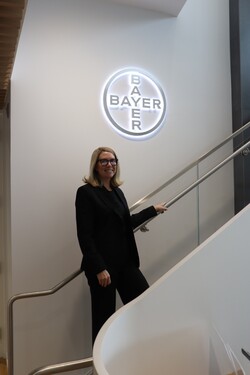BOSTON, Mass. -- By Lee Han-soo/Korea Biomedical Review correspondent -- Bayer Pharmaceuticals has recently made a significant shift in its strategic focus by placing a strong emphasis on oncology research and development.
Recognizing the urgent need for innovative solutions in cancer treatment, Bayer has recently vowed to become one of the world's top pharmaceutical companies in the field of cancer during a Bayer Pharma Media Day 2023 held in March at the headquarters of its Pharmaceuticals Division in Germany.
To this end, Bayer is investing heavily in anticancer drugs.
The company opened the Bayer Research and Innovation Center (BRIC) in Cambridge, Boston, Massachusetts, in June of last year by investing $140 million.

In an exclusive interview with Sybil Williams, Vice President and Global Head of Oncology Research and Site Head of BRIC, Korea Biomedical Review was able to hear insights into her roles and Bayer's vision for the future of oncology research in Boston, Mass., on June 7.
When asked how Bayer plans to achieve its ambition to become one of the top pharmaceutical companies in the field of oncology, Williams emphasized Bayer's commitment to precision drug development and its focus on the future of cancer care.
"As our focus here at BRIC is absolutely in precision medicine, we have a very important team here," she said. "Also, while we view internal research and development as a very important part of our sustained and robust portfolio, it's not the only part as we view academic collaborations as equally important."
As an example, Williams highlights BRIC's robust collaboration with the Broad Institute of MIT and Harvard, accelerating research into clinical development.
"We have been very effective in bringing forward multiple programs into clinical development with the Broad Institute, and we will continue to do," she said. "We also have a long-standing collaboration with the German Cancer Research Center (DKFZ)."
Williams explained that Bayer also puts a lot of emphasis on collaboration with biotech companies.
"Our arm's length companies, such as Vividion Therapeutics, AskBio, and BlueRock Therapeutics, are very important to our pipeline," she said. "We also interact very closely with Leaps by Bayer, our venture capital arm, to also cooperate with small bioventures from the earliest stages."
This is one of the main reasons why Bayer invested in establishing the BRIC at the heart of Kendall Square, which has a very rich biotech environment.
The area is also home to more than 300 life sciences companies and world-class academic institutions and hospitals.
The goal here is for BRIC to drive collaborations in this environment.

Precision molecular oncology to lead Bayer's anticancer drug development
During the interview, Williams also expressed enthusiasm about her team's focus on precision drug development in oncology.
"The Boston-based team is dedicated to pioneering the next generation of therapeutics with a specific focus on precision drug development in oncology," she said. "Precision drug development is really to be able to overcome some of the major pitfalls of drug development that we know in oncology."
Williams identified key reasons for the failure of oncology drugs in the development process: inadequate addressing of pitfalls such as understanding the target-to-disease link, predefining the patient population, and ensuring safety.
"As a result, the way we think about precision drug development is very simple as we aim to address all three pitfalls," she said. "We believe that if you have these things in place, it will have a significant impact in early clinical development as it will allow faster decision making."
Williams also stressed that precision drug development should still be centered around patients and whether the drug will have an impact for patients.
Regarding the selection and prioritization of potential drug candidates, Williams emphasized Bayer's focus on addressing unmet medical needs and the understanding of target-to-disease links and the company's current focus on gastrointestinal (GI), genitourinary (GU), solid tumors and non-small cell lung cancer (NSCLC).
"Notably, the company's strengths in modalities allow for tailored approaches in developing such treatments," she said.
Bayer already has a strong foundation to drive growth in oncology
Responding to some concerns about the lack of blockbuster oncology products from Bayer since the launch of Nexavar, Stivarga, and Nubeqa, Williams offered a different perspective.
She noted that Bayer already has six marketed products in its portfolio -- Stivarga, Nexavar, Nubeqa, Xofigo, Aliqopa, and Vitrakvi – and viewed this as a solid foundation to build upon and emphasized Bayer's focus on targeted radionuclide therapies, specifically the area of targeted alpha therapies (TAT) and next-generation immuno-oncology in their quest to address unmet medical needs.
"We also have a significant early clinical pipeline in the area of immuno-oncology and we are very interested in bringing forward the next generation of immuno-oncology agents focused in the area of precision medicine," she said. "Not only immuno-oncology, but precision molecular oncology, which is going after oncogenic signaling pathways as well as targeting tumor-specific vulnerabilities, will also change the oncology landscape."
Notably, Williams expressed confidence in Bayer's early clinical program, particularly the EGFR Exon 20 inhibitor program developed in collaboration with the renowned Broad Institute of MIT and Harvard.
"As Bayer Pharmaceuticals continues to make strides in precision molecular oncology, our focus on precision drug development, collaborations, and innovation positions us as a promising contender in the field of oncology research," she said.
With a strong portfolio of marketed products and a robust pipeline, Bayer is poised to make significant contributions to the advancement of cancer care, she added.
Related articles
- [KBR Exclusive: Inside Boston Biocluster] Pfizer’s early clinical focus: boosting success, slashing costs
- [KBR Exclusive: Inside Boston Biocluster] Transforming R&D strategy and embracing innovation: Takeda R&D chief
- [KBR Exclusive: Inside Boston Biocluster] Bayer spearheads cell and gene therapy advancement, shaping healthcare’s future
- [KBR Exclusive: Inside Boston Biocluster] Moderna's rise to prominence in the Covid-19 era and beyond
- [KBR Exclusive: Inside Boston Biocluster] Korean scientist at Moderna pioneers process chemistry
- Bayer North Asia to take helm in advancing radiology innovation

